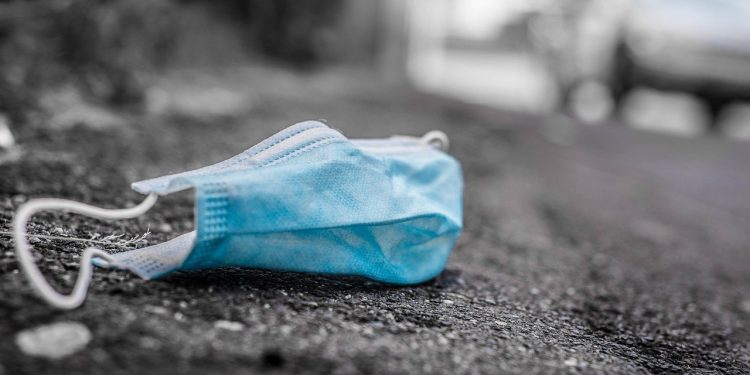Dhanada K Mishra
Hong Kong discards between 4-6 million disposable face masks every day! The bulk of the discarded face masks are sent to the landfill along with the general waste. Based on the estimation that each face mask weighs two to three grams, the face masks disposed of at landfills every day would weigh some 10 to 15 tons. But a significant number end up polluting the environment including the drains, streams, beaches, and end up in the sea. According to the Secretary of the Environment of the Hong Kong government, these face masks are not suitable for recycling. She said, “Since disposable face masks, including N95 masks and surgical masks, are made of composite materials of different kinds and metals which are difficult to be separated, they are not suitable for recycling or discarding in recycling bins to avoid contaminating other recyclables.” The global figures are approximately 1,000 times more at 15,000 tons a day. The bulk of the discarded face masks are either incinerated or sent to the landfill along with municipality solid waste.
Sustainable management of increasing quantities of wastes such as municipal solid waste (MSW), industrial wastes, agricultural wastes, construction demolition waste (CDW) etc. is a global challenge. Municipal solid waste generation will increase to 3.40 billion metric tons by 2050 from around 2.01 billion tons currently as per a World Bank report. In 2016, the world produced 242 million tons of plastic waste as part of MSW, which was about 12 per cent. It is estimated that only 13.5% of today’s waste is recycled and 5.5% is composted. Plastic waste is choking our oceans, yet our consumption of plastics is only increasing. The Covid-19 pandemic has added significantly to this crisis by a sudden increase in the consumption of Personal Protective Equipment (PPE). An estimated 1.6 billion tons of carbon dioxide – equivalent (CO2-equivalent) greenhouse gas emissions were generated from solid waste in 2016, which is about 5 per cent of global emissions. Without improvements, solid waste-related emissions are anticipated to increase to 2.6 billion tons of CO2-equivalent by 2050. Much of this comes from the food waste comprising 44% of MSW (contributing 50% of the GHG emissions from rotting) and the fact that 33% of all MSW are disposed of in open dumps and/or burnt.
The global distribution of population compared to percentage of waste generation shows China and India to be major contributors (36% of world’s population with 28% share in MSW) closely followed by the USA (4% world’s population contributing 12% of the waste!). Such disparities are likely to exacerbate further by the current pandemic. For example, South Asia is one of the hardest-hit regions with the Covid-19 outbreak and, India alone with an average of nearly 90,000 new Covid-19 confirmed cases per day in the recent past, might surpass the USA as the country most affected by Covid-19, in the coming months. The pandemic outbreak in the South Asia region is not only harming public health through community transmission or clusters of cases but becoming a huge liability for the potential environmental impact. The healthcare waste management system of the South Asia region is the least developed among the World Health Organization regions.
Delhi, the capital of India, generated about 371 tons of biomedical waste per day in June 2020. This quantity was increased by 1,400% as compared to 25 tons per day in May 2020. Uttar Pradesh, the highest populated state in India, generated about 247 tons of infectious medical waste per day in July 2020, despite having less than 10 tons per day of installed capacity of treatment. Dhaka, the capital of Bangladesh, is generating nearly 7,000% more biomedical waste from 3 tons per day before the Covid-19 outbreak to 206 tons per day as of July 2020. Similar trends of infectious medical waste generation due to the Covid-19 are observed in other countries of the South Asia region.
While the prospects of a zero waste future may look utopian in light of the above scenario, it is not as difficult as we are made to believe. Hong Kong has performed abysmally against its own target as per the government issued “Hong Kong Blueprint for Sustainable Use of Resources 2013-2022”, in 2013, which set out a comprehensive strategy to reduce waste and increase recovery and recycling. A recycling fund of one billion Hong Kong dollars has not made any significant dent yet with the proposed ‘Waste Charging Fee’ proposal stuck in the legislative process. However, the experience of neighbouring Taiwan and South Korea is highly encouraging. South Korea adopted a waste charging policy way back in 1995 and observed that the overall waste disposal rate substantially dropped by 40% within a few years. The recycling rate increased to 60%, whereas the economic benefits of the recycling industry increased from HK$1.7 billion in 2001 to HK$7 billion in 2009. The “per Bag Trash Collection Fee’ system has worked well in Seoul after it was adopted from Taipei. This illustrates the fact that modern societies driven by rampant consumerism need to pay for their environmental footprint – be it in the form of a carbon tax or waste charging system. The detrimental effect of our lifestyles driving run-away climate crisis can only be tamed by such a ‘user pay’ model and implementation of circular economy principles by producers and manufacturers.
For a ‘zero waste’ future to be realised the first step has to be for policy makers in power such as the Secretary of Environment of Hong Kong to change their mindset. While recycling the ubiquitous disposable face mask is not easy, it is not impossible along with the bulk of the waste plastics that currently goes to the landfill. India’s ‘Recycle Man’ – 27-year-old Vinish Desai claims to recycle PPE, including disposable face masks, into bricks that can be used for construction. It has also been demonstrated that much of the waste plastics can be converted back to fuel oil through catalytic thermal pyrolysis by scientists from VSSUT, lightweight plastic aggregates for use in concrete by a company in New Zealand or melted and simply reshaped into plastic products like bricks, blocks and plates that can be found online etc. Only by such innovative ideas supported by progressive policy support from the governments, can the world hope to avoid the inevitable waste plastic pandemic in future.
The author is an academician currently visiting Hong Kong University of Science and Technology as a Research Scholar. He can be reached by email at dhanadam@gmail.com.






































